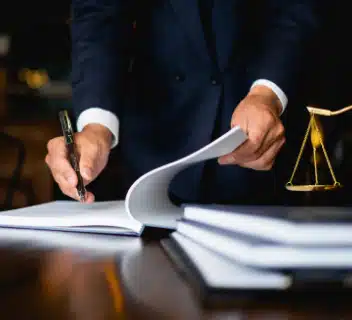Top 10 Essential Questions to Ask Your Lawyer About Your Case
Asking the right questions to your lawyer about your case is essential for understanding your situation and ensuring effective legal representation. This article highlights key questions to ask your lawyer about your case, the potential outcomes, and the strategies you’ll use. These questions to ask your lawyer about your case will help you prepare better and improve your case’s chances of success.
Key Takeaways
- Choose a lawyer with relevant experience and a strong track record in similar cases to boost your chances of a favorable outcome.
- Understand the expected timeline and costs associated with your case, including any potential risks and delays.
- Establish clear communication with your lawyer and gather necessary documentation to strengthen your case effectively.
How Much Experience Do You Have with Similar Cases?
Experience matters, especially when it comes to litigation. When selecting a lawyer for your personal injury case, ensure they have substantial experience handling similar cases. This isn’t just about years in practice; it’s about relevant experience that directly impacts your situation.
Inquire about how many trials the lawyer has been involved in and the outcomes of those cases. Knowing their success rate in the courtroom can give you a better understanding of their effectiveness. For example, if they’ve won a significant percentage of their cases, it’s a good indicator that they are familiar with the intricacies of personal injury litigation and can navigate the complexities of your case.
Understanding the variety of cases your lawyer has handled is also beneficial. This can provide insight into their adaptability and expertise across different scenarios. Choosing a lawyer with proven experience and success in similar cases increases your chances of a favorable outcome.
What Are the Potential Outcomes of My Case?
Understanding the potential outcomes of your case is crucial for setting realistic expectations. The best outcome could be an acquittal, where a judge finds you not guilty. However, various factors can determine what can happen, including changes in laws and court scheduling delays.
Talking about potential outcomes helps you grasp the range of possible results for your case. Your lawyer can estimate potential compensation based on damages, helping frame expected outcomes. Negotiating a settlement is often a viable option and can lead to favorable results outside of court. However, remember that success is not guaranteed, and various risk factors can influence your outcome. It’s important to talk through these aspects with your lawyer.
Effective negotiation strategies often result in shorter trials, increasing your chances for favorable outcomes. Thorough preparation is key for a trial, ensuring all necessary evidence and testimonies are ready. Knowing these aspects can be helpful in navigating the legal process and preparing for what lies ahead.
What Will Be Our Strategy Moving Forward?
Having a strategic plan tailored to your business case is essential. Discussing this consultation with your lawyer clarifies their approach, including key legal issues, evidence evaluation, and potential weaknesses. Understanding how many of their cases settle versus those that go to trial provides insight into their legal strategy.
The stages of the legal process and their typical durations are:
- The pre-filing stage, which includes investigation and negotiation, can take several weeks to months.
- The discovery phase, where both parties exchange information, can last from three to nine months or even longer, depending on the complexity of the case.
- Trial lengths vary significantly; they can range from a few days for simple cases to several weeks for more complicated ones.
Grasping each phase and its duration helps you explain the overall timeline and what to expect to some extent. This clarity helps you prepare adequately and stay aware throughout the present process.
How Long Will the Process Take?
Knowing the timeline from filing to resolution is vital for effective handling of your case. The typical duration for similar cases can vary significantly depending on the jurisdiction and specific details of your case. An estimate from your lawyer offers a clearer picture of the process duration.
Knowing why your case may take longer than expected, such as unforeseen delays, is also important. Your attorney will develop a timeline highlighting key stages and deadlines, helping you stay on track and manage expectations.
What Are the Legal Fees and Costs Involved?
Understanding the cost structure is crucial for managing your financial obligations effectively during a legal case. It’s important to understand that most personal injury attorneys work on a contingency fee basis, meaning you only pay attorney fees if compensation is secured.
That being said, discussing the fee schedule, including terms of representation, costs, and billing procedures, helps avoid surprises.
For those working with attorneys who are not operating on a contingency fee basis, costs can include:
- Filing fees
- Courtroom transcripts
- Charges for photocopies
- Attorney fees
- Court costs
Prolonged litigation can result in unforeseen financial risks due to accumulated costs. Clients can negotiate payment plans with attorneys, easing the financial burden of paid costs.
Requesting a budget and monthly invoicing helps manage the financial aspects of your case effectively. Understanding the legal fees and costs involved helps you prepare for the financial commitments and avoid unexpected expenses.
Who Will Be Handling My Case?
Knowing the lead attorney and support staff involved in your case is crucial. To better understand the lawyer’s experience and client treatment, consider the following steps:
- Speak to a reference with a similar case.
- Inquire about another similar case they’ve won.
- Ask about any related losses to gain insight into their track record with other clients.
Knowing how your lawyers work and what to expect from them is essential. Spend time with the attorney, perhaps over lunch, to get a sense of their personality and professionalism. This helps ensure they are the right fit for you and your case, and that you have a good lawyer on your side. Finding a lawyer who is equipped to effectively handle your dispute can make all the difference.
How Should I Communicate with You?
Establishing preferred methods of communication with your lawyer is crucial for effective correspondence. In emergencies or urgent issues, ensure you have your lawyer’s contact information readily available. This helps keep the lines of communication open and ensures you can reach them when needed.
Proactive communication and prompt responses to inquiries help keep your case on track. Your involvement will depend on the lawyer’s communication preferences and the need for updates, so clarify this early on.
What Documentation and Evidence Do You Need from Me?
Collecting documents that support your case, such as school records, medical records, and police reports, is crucial for building a strong argument. Your attorney will guide you in understanding which documents are relevant and assist in collecting necessary evidence. Preserve documents that could be beneficial for your case, including those that may seem unfavorable.
Crucial evidence types include medical records, police reports, witness statements, and writing. An attorney may require specific documentation and evidence as the case progresses, so being prepared can streamline the process.
What Are the Risks and Challenges We Might Face?
Every potential reward carries some risk, which is crucial to understand in personal injury cases. Lack of proof or evidence, such as unavailable witnesses, can significantly weaken a case’s position. The benefits of recognizing adverse reactions from opposing parties can also challenge legal proceedings, and finding the right answers can be essential in navigating these complexities. It is important to argue the merits of each piece of evidence presented, especially in the context of any potential offense, interest, defense, and likelihood from the other side. If the other side presents evidence that is wrong, it can necessarily further complicate the case in the life of the legal process.
Unforeseen circumstances may complicate legal proceedings. Openly discussing potential concerns and challenges with your lawyer can help mitigate risks and inform your strategy. Knowing the specifics of the dispute and potential roadblocks helps set realistic expectations and prepare for challenges.
How Can I Assist in Strengthening My Case?
To strengthen your case, consider the following:
- Collect and organize all relevant evidence and documentation to cover your bases and protect your interests.
- Be honest with your lawyer about all details to develop a strong strategy and investigate your options.
- Hire expert witnesses to provide specialized insights.
Your personal injury lawyer can advise on handling interactions with insurance companies. Being open and honest with your attorney personally is crucial for winning, as they need full access to the facts to represent you effectively.
Summary
In summary, having the right questions to ask your lawyer about your case can significantly impact the outcome of your case. From understanding your lawyer’s experience to discussing potential outcomes and strategies, each question helps you gain clarity and set realistic expectations.
By being proactive and informed, you can work more effectively with your legal team and navigate the complexities of the legal process. Remember, the more prepared you are, the better your chances of achieving a favorable outcome.
If you have questions to ask your lawyer about your case, contact 1-800-THE-LAW2 today for a free consultation with an attorney in our network.
Frequently Asked Questions
It’s really important to ask about a lawyer’s experience with similar cases; it gives you insight into their expertise and track record. This can significantly impact your confidence in their ability to handle your situation effectively.
Your case could end in various ways, from acquittal to a plea bargain or conviction. Keep in mind that factors like changing laws and court scheduling can influence these outcomes.
It’s crucial to get a clear picture of the cost structure, including contingency fees and extra expenses, so you can manage your finances effectively throughout your case. Being informed will help you avoid any surprises down the line.
It’s crucial to discuss and agree on your preferred ways to communicate with your lawyer, making sure you have their contact info handy for any urgent matters. This establishes a clear line of communication that can help your case run smoothly.
You’ll need to gather important documents like medical records, police reports, and witness statements to strengthen your case. These pieces of evidence are essential for showcasing your situation effectively.




